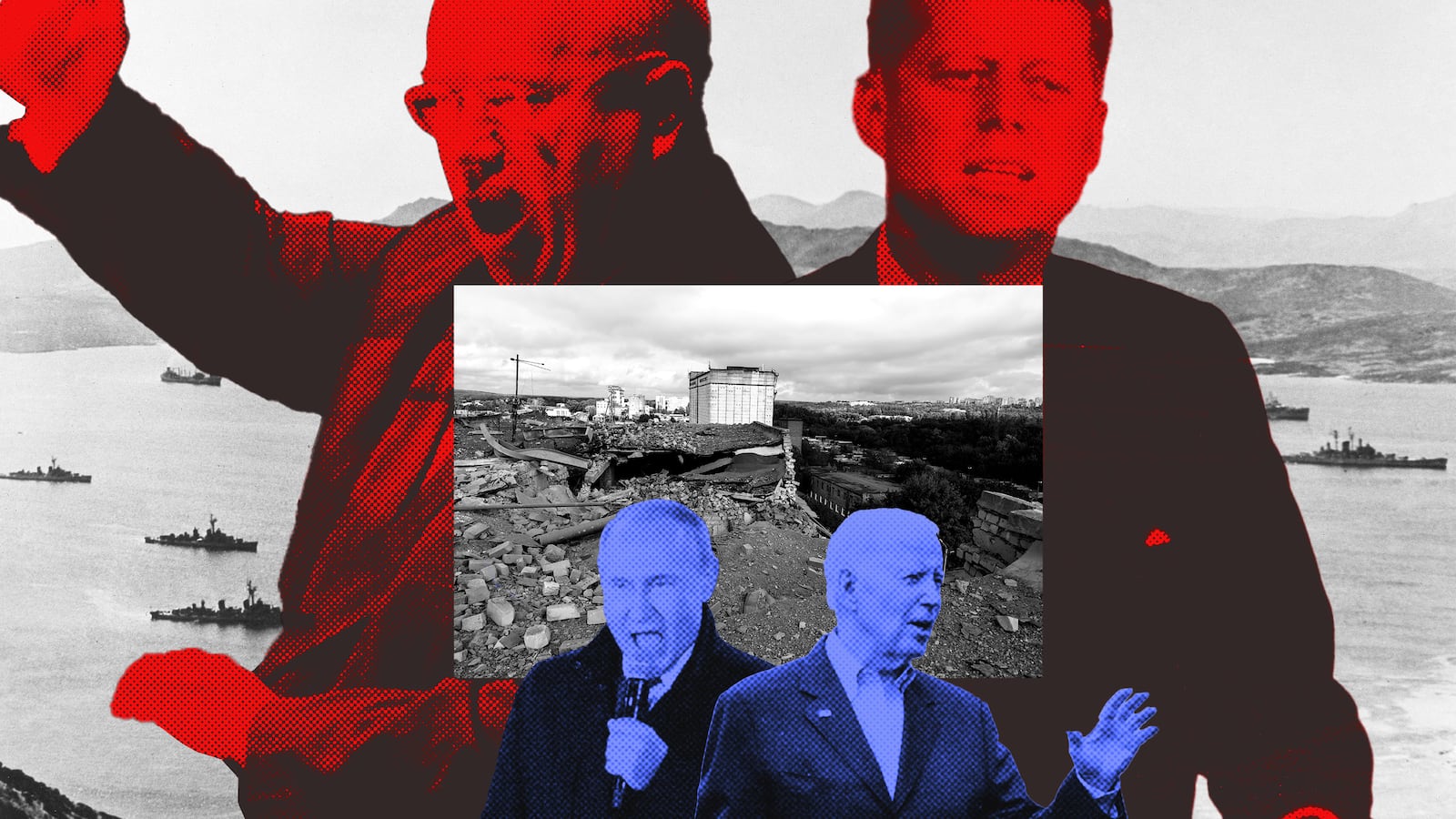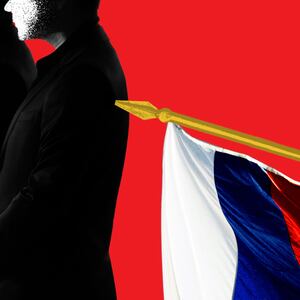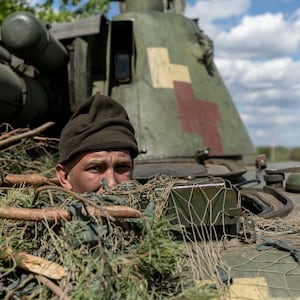This month marks the 60th anniversary of the Cuban Missile Crisis. The parallels with the current confrontation between the United States and Russia are striking.
For a few weeks in October and November of 1962, the U.S. and the Soviet Union teetered on the brink of a global thermonuclear war. In some ways, the situation now is even worse.
Even in the fall of 1962, the KGB wasn’t helping the Cuban military sink American ships and assassinate American generals and openly bragging about it to reporters for Pravda—like American intelligence recently bragged about those operations in aid of Ukraine to The New York Times.
After Russia’s annexation of multiple Russian-controlled areas of Ukraine, senior Carnegie Endowment fellow Alexander Gabuev has said the United States and Russia are only “two or three steps” away from the use of nuclear weapons. As the escalation spiral continues, it’s difficult to imagine Russian President Vladimir Putin carrying out his threat to conduct a small-scale nuclear strike in Ukraine (following the precedent he says was set by the U.S. at Hiroshima and Nagasaki) without Joe Biden and other western leaders responding in ways that could end civilization.
Disaster was averted in the Cuban Missile Crisis because Soviet leader Nikita Khrushchev and U.S. President John F. Kennedy both ignored hawks within their respective camps who insisted that negotiated de-escalation was “appeasement” of a dangerous enemy.
Sixty years later, the only sure path away from the brink is for Biden and Putin to follow their example.
A Tale of Two Crises
In both cases, a less powerful nation (Cuba, Ukraine) acted on an entirely legitimate fear of a regional great power (the U.S., Russia) by seeking out a military alliance with the rival power.
Cuba had fought off a U.S.-sponsored invasion the year before at the Bay of Pigs, and sought a deterrent from future invasions by inviting the Soviet Union to place nuclear missiles on its territory.

Muscovites yell and shout as they demonstrate near the U.S. Embassy in protest against the U.S. blockade of Cuba.
VCG Wilson/Bettmann Archive/GettyUkraine had already lost pieces of its territory to Russian-backed separatists and sought membership in NATO. If that effort was ever successful, any future Russian invasion of the country would trigger Article 5 of the NATO charter, committing every member of the alliance to consider itself to have been attacked and respond accordingly.
Some reports claim that Putin rejected a preliminary peace guaranteeing Ukrainian neutrality back in February because concessions on other issues didn’t go far enough, although neither side will confirm the existence of such a deal—and, significantly, no such hypothetical deal seems to have had direct U.S. buy-in. Some have even claimed that the NATO issue is a smokescreen—although that’s not really plausible. Russian leaders long before Vladimir Putin were alarmed by NATO expansion in Eastern Europe, and a long chorus of mainstream foreign policy wonks who couldn’t be accused of pro-Russian sympathies warned that such expansion could inflame tensions.
Even so, that’s certainly not the only issue, and there’s no denying that Russia is engaged in superpower bullying of a vulnerable neighbor. Nor can it be claimed that such bullying is purely a result of the NATO issue—just as, long before the issue of Soviet missiles came on the scene, the U.S. was engaged in belligerence toward Cuba, ranging from repeated attempts to assassinate Cuban leader Fidel Castro to an attempted invasion.

Russian President Vladimir Putin with Ukrainian regional separatist leaders attends the annexation ceremony of four Ukrainian regions at the Grand Kremlin Palace, Sept. 30, 2022, in Moscow, Russia.
GettyDovish Imperialism?
In both cases, it’s hardly a mystery why the country facing down a superpower eager to enforce its traditional “sphere of influence” would seek out such protection. And a case could be made that the weaker country’s superpower ally negotiating away that direct military protection was a high-handed act.
For example, Robert Farley, a senior lecturer at the University of Kentucky Patterson School of Diplomacy and International Commerce, mocked those who claim to be “anti-imperialist” while saying that “Russia and the United States should sit down together and work out the future of Ukraine.” Similarly, one of the leaders of the Cuban Revolution, Che Guevara, was openly furious about Khrushchev agreeing to give up the missile base in Cuba.
From anti-imperialist revolutionaries like Guevara, such sentiments are understandable, if a bit short-sighted—a global thermonuclear war, after all, would decimate the global south no less than the global north. From mainstream liberals and conservatives, it’s far more confusing.
After all, the U.S. has had a direct seat at the table in negotiations to end conflicts from Northern Ireland to Israel/Palestine. Often, it brought considerable pressure to bear in order to get the most directly impacted parties to sit at the negotiating table.
And no one in mainstream western discourse ever suggested that this was an unacceptable high-handed or imperial thing for the United States to do. If anything, in a record of American foreign policy that’s been all-too-full of horrors— ranging from CIA-sponsored coups in Latin America to direct invasions to bring about “regime change” in the Middle East—sponsoring peace negotiations has been the least controversial part of that record.
Nor has anyone who has urged the U.S. to participate in such negotiations—like the linguist and radical political commentator Noam Chomsky or (before the war started) Sen. Bernie Sanders–advocated that the U.S. impose a settlement on the Ukrainian government by force. The suggestion, instead, has always been that we try to find a settlement all parties could be convinced was a preferable alternative to a bloody war in Ukraine, a global food crisis, and escalating superpower tensions that threaten to wipe out billions of human beings.
Perhaps such a settlement is no longer possible. Putin, after all, has claimed that the newly annexed territories are part of Russia “forever,” and may no longer be willing to limit himself to the more limited goals of Ukrainian neutrality and some sort of permanent settlement for the territories that had been held by Russian-backed separatists or by Russia itself since 2014. And if Putin is assassinated (or dies of natural causes), his replacement may well be the kind of hard-liner who thinks Putin hasn’t been brutal enough in making war in Ukraine.
But there’s simply no way to know what sort of settlement could emerge from negotiations between all the parties until everyone’s actually sat down at a table to try. That’s the one thing that has yet to happen.
Khruschev and Kennedy vs. the Hawks
Plenty of right-wingers thought Kennedy was a traitor and possibly a closet communist for “appeasing” Khrushchev and Castro. Plenty of hard-liners in the Communist Party of the Soviet Union thought that Khrushchev was a contemptible coward.
Here’s how Khrushchev recalled it years later:
<p>“When I asked the military advisors if they could assure me that holding fast would not result in the death of five hundred million human beings, they looked at me as though I was out of my mind, or what was worse, a traitor. The biggest tragedy, as they saw it, was not that our country might be devastated and everything lost, but that the Chinese or the Albanians might accuse us of appeasement or weakness. So I said to myself, ‘To hell with these maniacs. If I can get the United States to assure me that it will not attempt to overthrow the Cuban government, I will remove the missiles.’ That is what happened, and now I am reviled by the Chinese and the Albanians...They say I was afraid to stand up to a paper tiger. It is all such nonsense. What good would it have done me in the last hour of my life to know that though our great nation and the United States were in complete ruins, the national honor of the Soviet Union was intact?”</p>
We don’t and can’t know yet if a similar settlement is possible in this crisis. But Biden and Putin owe it to every human being on the planet to sit down and try.









